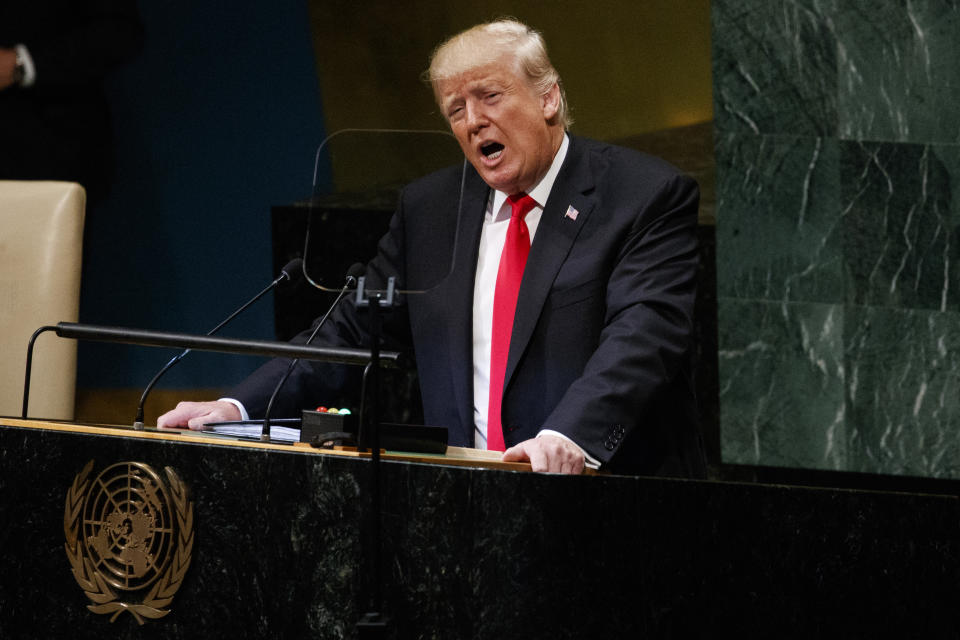Trump profits from globalization, even though he bashes it

President Trump told the world this week that “we reject the ideology of globalism.” But globalism has been crucial to the success of Trump’s own business, another instance of Trump the politician contradicting Trump the businessman.
Trump defended his America-first policies in an address to the United Nations, where he contrasted globalism with “patriotism” (as if they are mutually exclusive, which they are not). This is part of the formula that got Trump elected, and as president he has put anti-globalism into practice through new limits on legal immigration, withdrawal from international treaties and protectionist trade policy, including new tariffs on imports.
As head of the Trump Organization, however, Trump profited from the international system he now condemns. For starters, the Trump Organization’s lenders include foreign entities from Turkey, Russia and elsewhere. Beginning in the late 1990s, Trump relied heavily on Germany’s Deutsche Bank for loans, as American banks backed away from lending him money. That financial relationship foundered in 2008, with each side suing the other. But they settled in 2009 and began doing business again. The Trump Organization still owes Deutsche Bank millions of dollars.
Many of the Trump Organization’s customers are foreigners. As early as 2008, Donald Trump Jr., the president’s son, said Russians represented a “disproportionate cross-section” of the Trump Organization’s assets. A 2017 Reuters investigation found that elite Russians owned $100 million worth of real estate in seven Trump-branded properties in Florida. Many purchases in Trump buildings are now carried out by corporate entities that shield the identity of the actual purchaser, which could include foreigners who don’t want to be publicly linked with Trump.
Trump organization seeks business abroad
The Trump Organization operates in around 20 countries, with properties in Canada, Ireland, Scotland and South Korea. The company has licensed the Trump name for use in other countries, such as Brazil, Panama, Uruguay, Turkey, India and the Philippines. It continues to seek new business in foreign countries, and Trump was pursuing a tower project in Moscow even as he was running for president in 2016.
The Trump Organization also relies on immigrants and foreign guest workers to staff many of its properties in the United States. A Vox analysis of seasonal hiring at three Trump properties in 2016 and 2017, including the Mar-a-Lago resort in Florida, found that of 144 open positions, all but one went to foreign workers with temporary visas.
There’s nothing inherently wrong with any of these business practices. But they rely upon the easy movement of capital, labor and goods across borders, something Trump opposes as president. He wants to restrict most forms of immigration, even with 7 million unfilled jobs in the United States and labor shortages in some pockets of the economy. His new tariffs on imports are driving up costs for consumers and businesses that purchases thousands of components that are now more expensive, on account of the border tax. He has threatened to withdraw from treaties, such as the North American Free Trade Agreement, that facilitate trade, and replace them with new deals supposedly more favorable to U.S. interests.
Trump’s business is somewhat different from the companies that are beginning to suffer on account of his America-first economic policies. Since the Trump Organization is largely a service business earning fees from licensing deals and management contracts, it’s not directly affected by tariffs, which mostly hurt companies that purchase imported goods or export U.S.-made goods to other countries. And his reliance on foreign financing is an economic activity not targeted by America-first policies. Maybe those policies are Trump-first first, and America-first second.
Confidential tip line: rickjnewman@yahoo.com. Click here to get Rick’s stories by email.
Read more:
Rick Newman is the author of four books, including “Rebounders: How Winners Pivot from Setback to Success.” Follow him on Twitter: @rickjnewman

